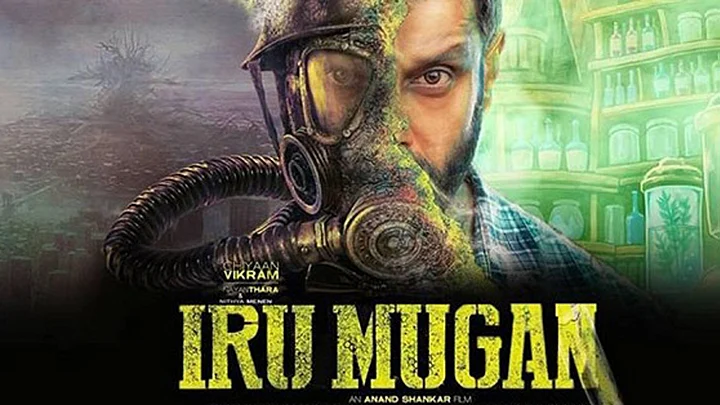For those who came in late, in Iru Mugan, Chiyaan Vikram plays a RAW agent, whose partner and wife were killed by his nemesis Luv, also played by Vikram. Luv is a transgender woman.
In an interview about Iru Mugan, the story/screenplay/dialogue/director Anand Shankar said Luv is an ode to Heath Ledger’s Joker.
No, man. No.
The Movie’s Bad, Vikram is Awesome
Because as the psycho-genius transgender villain ‘Luv’, Chiyaan Vikram is simply adorable. You can’t really fault him. There is no stereotypical affectation unlike Prakash Raj’s Maharani, or the original transgender pimp Maharani played by Sadashiv Amrapurkar.
In fact, he looks more real than the hero or the heroine, both of whom are constantly dolled up, even in the fight scenes.
And his open attraction to the hero Vikram is beautiful to watch. He/She oscillates between wanting to urgently kiss Vikram on the lips and to blow powdered acid in his face and watch it burn his skin.
‘Luv’ Alone is Real, all Else is Duplicate
We live in a world of remixes. Especially when it comes to the world of cinema. A majority of movies that have done well at the box-office over the last fifty years are either sequels, remixes of old content, or adaptations of novels or story anthologies.
Basically, it’s okay to copy. But if you’ve got to do it, you’ve got to do it right. The premise of the story itself is almost a direct rip-off of Iron Man-3.
Extremis (injection that gives superhuman strength, but then destroys you) = Speed2 (inhaler that gives superhuman strength, then weakens you).
There’s no other thought to the movie. It’s almost like an entire movie was written to somehow fit in this ‘ethavathu different-a’ concept.
Every dialogue in the movie, except for Thambi Ramaiah’s and Karunakaran’s comedy track, is predictable. It’s okay to guess that Nayanthara would rise from the dead fifteen minutes before the interval. What’s not okay, is that you sort of know exactly what she’s going to say after that, before it happens.
Harris Jayaraj! I Didn’t think I’d Say It, But...
The songs in the movie are good! Helana... the first song to blast story logic to smithereens, is actually sort of addictive. It’s choreographed for Nayanthara, whose presence is incendiary. And it’s really, really hard to see Vikram as a happy-go-lucky lover boy just seconds after thinking he’s a Ludlum level super spy.
And then there’s Kannai Vittu, that’s set in a kind of Baroque meets GoT palace, as soon as Vikram is kidnapped by Luv. Let’s pause here.
Song and dance sequences have been a part of Indian cinema since almost the very beginning. I believe it’s a narrative style; one that allows the viewer to let his emotions and imagination run free, only to return to an already familiar story. And in this sense, Kannai Vittu comes at just the right time. It lets me feel the hero’s pain of separation from the love of his life.
Until, of course, Vikram tries to dance hip-hop style.
It’s not Transgender Folk that ‘Irumugan’ Insults
It’s women. Both Nayanthara and Nithya Menen start off looking like strong, independent women. And within a few minutes, Anand Shankar turns them into different shades of dork.
After four years of amnesia and hardcore undercover work, the first thing Nayanthara asks Vikram, when they’re ‘finally alone’ in a car is, “Who is that prostitute?”
There is a potentially awesome moment in the movie, where Nayanthara takes the ‘superhuman’ drug to get into a dog fight. She strikes the pose, and then it cuts to the scene that comes after the fight. What a waste!
The story ends, with the hero sucking in a lungful of the drug that was touted as evil throughout the movie. No, it’s actually meant to be a happy ending. You see, here’s how it goes:
Heroine: It took you four years to marry me. Now you say you want a baby, I’m sure you’ll take two, three years more.
Hero: No, this time, sooner.
Heroine: One year?
Hero: Sooner.
Heroine: Ten months! (smiles with joyous awe)
Hero: Sooner.
Heroine: (Surprised like a schoolgirl. Mind you, she too is a RAW agent) How is that even possible.
<Hero then smiles and runs to the back of the boat. Inhales the drug and smiles at the audience>
And so, like decking an already mediocre pizza with a mixture of rock salt and cinnamon, the movie ends as a bad joke, with an actual joke that’s even worse.
Moral of the Story
For Anand Shankar (Story/Screenplay/Dialogue/Director): Man, just stick to one job. Find someone to write dialogues. Don’t waste Vikram.
For the Audience (Me): Single screen theatres are good for nostalgia. You’re now used to the sound and ambience of a multiplex. Next time, go there. You can dream of the squeaky chairs and the scent of urea, from the comfort of a clean odourless sofa.
(At The Quint, we question everything. Play an active role in shaping our journalism by becoming a member today.)
